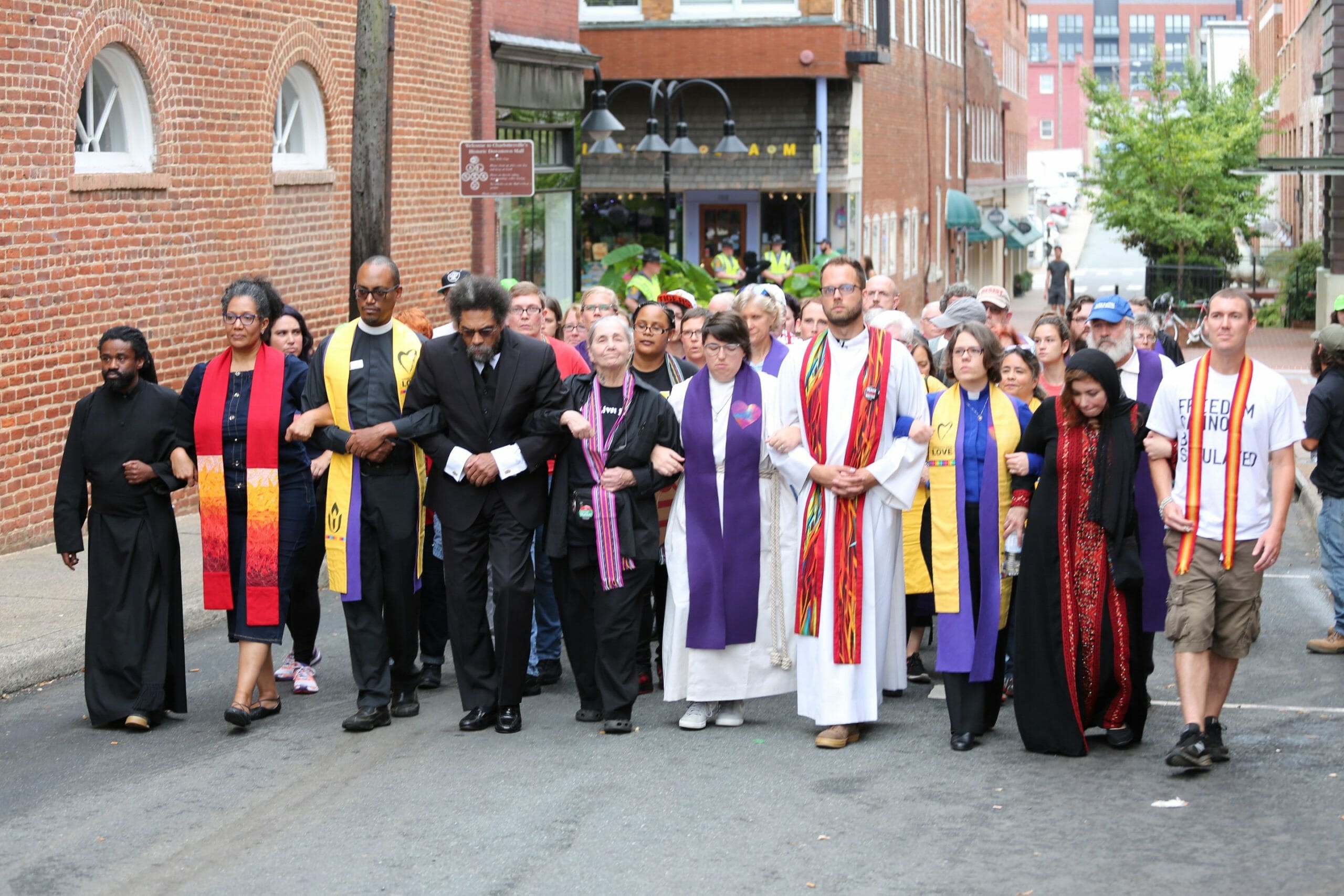
Photograph by Steven D. Martin, National Council of Churches
Thou shall not be a bystander
Claire Hein Blanton
April 20, 2020
Almost three years, the United States watched as white supremacists came together in Charlottesville, Virginia. Among the images that stick out in my mind is the one of religious leaders linking arms, literally and figuratively proclaiming that the neo-Nazis were not welcome. And yet, worldwide, there has been a dramatic increase in far-right nationalist violence in the immediate past. This is troubling for many reasons. As we reflect on Yom HaShoah, Israel’s Holocaust Remembrance Day, which begins at sundown on April 20,[i] we should revisit the lessons that we should have learned by now.
Nationalism, whether political or ethnically based, led to a terrible trend of genocides over the twentieth century. We learn about the Holocaust in our history textbooks, but I worry that because it is history, we lack the insight to remember that other genocides have happened more recently. The breakup of the Balkans and the mass killings in Rwanda both happened when I was a child. Today, attacks upon minority groups worldwide mark a continuation of this same type of hatred. Societies have seen this most acutely amid the COVID-19 pandemic, as Daniel Trilling writes in The Guardian. Speculations that foreign nationals residing in the United States are somehow responsible for bringing in disease not only defies logic but reeks of racism, nationalism and the rhetoric used by nationalists to justify oppression and mass killings.
As Christians, we must act against this surge in nationalism. The church failed to act appreciably during the Holocaust. In fact, the lack of action against the Third Reich led to a split in the Protestant church, with some clearly siding with the Third Reich (the German Christians), some taking a proactive stance against Nazi co-option of the church (the Confessing Church), and the majority silently taking neither side, but witnessing the horrors. Victoria Barnett’s work on this split, For the Soul of the People, concludes with the warning,
“Human religious faith, its dream, philosophy, and morality, all the edifices of mind and spirit, cannot be mastered by any nation. Earthly rulers have always been tempted to try.” (Barnett, For the Soul of the People, 309)
The linking of arms of the religious leaders in Charlottesville speaks to this. It proclaims that all people are created in the imago Dei, not just those who look and act a certain way. The church did little to stop the Holocaust. We must do more now. On a large scale, this means uniting our voices and speaking out against the base impulses. The Baptist Joint Committee launched an educational outreach campaign in 2019 to take a firm stand against Christian nationalism and its close association with white nationalism. To date, more than 15,000 Christians have endorsed this movement.
The Yehuda Bauer quote, “thou shall not be a bystander,” is a reminder that by doing nothing, we do not remain blameless. As we reflect this month, on those lost in the Holocaust and the redemption offered on Easter, let us remember that love sets us free and that in love there is no place for nationalism.
Individually, we must be stop this behavior when we see it. The Yehuda Bauer quote, “thou shall not be a bystander,” appears at the Holocaust Museum in Houston. It is a reminder that by doing nothing, we do not remain blameless. On my desk is a photo I took outside the gates of Sachsenhausen, the concentration camp outside of Berlin. It bears the familiar words, “Arbeit macht frei” (Work will make you free). It’s a stark reminder of the lies that have led to millions of deaths. As we reflect this month, on those lost in the Holocaust and the redemption offered on Easter, let us remember that love sets us free and that in love there is no place for nationalism.
Claire Hein Blanton is an ordained Baptist minister in Houston, Texas. She is currently studying for her PhD in systematic theology and ethics from the University of Aberdeen.
The views expressed are those of the author and not necessarily those of American Baptist Home Mission Societies.
[i] International Holocaust Remembrance Day, designated by the United Nations General Assembly in 2005, is observed on January 27, the anniversary of the liberation of Auschwitz. Yom HaShoah, officially established by the Israeli Knesset in 1959, is observed on 27 Nisan in the Hebrew calendar. In 2020, Yom HaShoah begins at sundown on April 20, and ends at nightfall on April 21.


